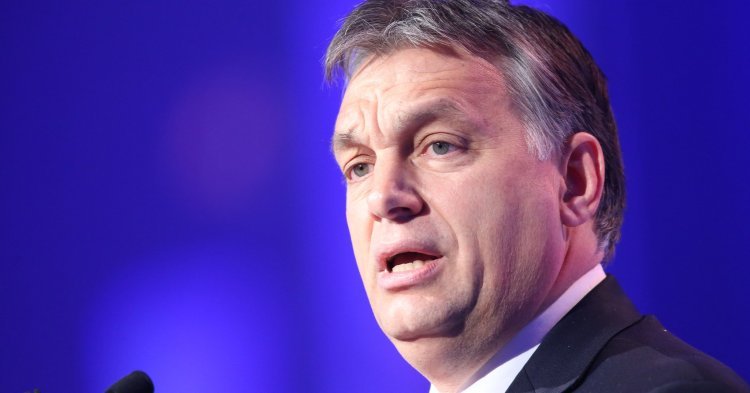This might change after two speeches held by Prime Minister Orban since his reelection: that of his swearing in as Prime Minister on 10 May and another one he held on 28 July. Both speeches are fundamental as they set out the ideology he is contemplating both for Hungarian society and for Europe. All the citations below come from the official translations of these speeches.
Encouraged by a third consecutive victory (following elections about which concerns were widely expressed domestically and internationally), the Hungarian Prime Minister tries to position himself as the leader of what he sees as a new anti-liberal, mostly Central European front crusading against immigration and the federalist ambitions of liberal Brussels.
A new, illiberal Christian era
For 8 years, successive Orban governments have transformed the way the Hungarian state functions. With the rule of law undermined and checks and balances weakened, Orban’s regime came to be known as “illiberal democracy” throughout Europe.
Now, after his third victory, the Hungarian leader feels that transforming the Hungarian constitutional order was not enough. Instead, he feels he has been “mandated to build a new era” that he defines as:
“a spiritual order, a kind of prevailing mood, perhaps even taste – a form of attitude. A political system is usually determined by rules and political decisions. An era, however, is more than this. An era is determined by cultural trends, collective beliefs and social customs. [...] After the third two-thirds victory we really need to adopt a spiritual and cultural approach; and there is no denying that from September major changes lie ahead of us.”
Orban seems to plan a strong takeover that will sweep through the fields of culture, education and people’s private lives and choices. Such policies were already present in his previous mandate but in this new “era”, what happens to those who dissent from the prevailing mood or taste, or the underlying collective beliefs, is left to one’s imagination. When a politician promotes the idea that it is collective beliefs, trends and tastes (as opposed to pluralistic public debate) that should dictate rules and laws, one can hardly avoid hearing the echoes of totalitarian narratives of the past.
He goes on:
“The age of liberal democracy is at an end. Our response [...] has been to replace the shipwreck of liberal democracy by building 21st-century Christian democracy. […] We are Christian democrats, and we want Christian democracy.”
But before his EPP colleagues rejoice at the idea that being a Christian democrat does not exclude supporting liberal democracy, he quickly asserts that:
“Christian democracy is not liberal. Liberal democracy is liberal, while Christian democracy is, by definition, not liberal: it is, if you like, illiberal. […] Liberal democracy is in favour of multiculturalism, while Christian democracy gives priority to Christian culture; this is an illiberal concept. Liberal democracy is pro-immigration, while Christian democracy is anti-immigration; this is again a genuinely illiberal concept. And liberal democracy sides with adaptable family models, while Christian democracy rests on the foundations of the Christian family model; once more, this is an illiberal concept.”
Those who start feeling confused by the simultaneous but contrasting use of the adjectives “Christian” and “liberal” to depict forms of government as well as political families are on the right track. Orban’s “Christian democracy” is not a reference to a Christian democratic government’s agenda, it is rather another way to designate his illiberal regime, camouflaging it into mainstream conservative semantics. How this linguistic trick will translate in the debate on the future of Europe and the European elections is still to be seen.
The survival of a nation
The Hungarian leader goes further, though. Invoking the threat of demographic extinction, he makes of the building of Christian illiberal democracy not only an option but a question of survival:
“The situation today is that Hungarians account for 0.2 per cent of the total world population. From this, it clearly follows that the survival of Hungarians as a nation is not automatic. For populous peoples with extensive cultural networks it is simply inconceivable that there could be a world without them: a world in which their kind does not exist. Hungarian policy however should be predicated on the possibility that we could disappear, we could be dispersed, we could become extinct, and the world could go on without that species of Homo sapiens known as the Hungarians. […] Survival is a question of life force and therefore the Hungarian state and the Hungarian government of the day must be stable, strong and ready to take action. This takes priority over everything; this supersedes all else.”
The threat of the extinction of the nation therefore seems to justify the illiberal nature of the regime. It also explains the Orban government’s highly conservative stance in social policy including its image about the family, its macho discourses about women or the ban on teaching gender studies. Another element is Hungary’s geographical position:
“To the West is the land of German iron chancellors; to the East the Slavic world of military nations; and to the South the Islamic multitude. Berlin, Moscow and Istanbul: these are the vertices which define the area within which Hungary lives. […] My government believes that, to ensure freedom, it is not enough to keep the three great armies – of Germany, Russia and Turkey – outside the Carpathian Basin.”
The biggest threat, however, is the European Union and, within it, the conspiracy of liberal forces that seem to be pursuing a very specific goal:
“In Brussels nowadays there are thousands of paid activists, bureaucrats and politicians working to have migration declared a fundamental human right. Therefore they want to deprive us of the right to decide for ourselves who we let in to the country and who we refuse entry to.”
At the heart of the migratory conspiracy, Orban’s biggest nightmare appears: federal Europe.
“I am convinced that migration eventually leads to the disintegration of nations and states: national languages weaken, borders become blurred, national cultures dissolve; and what remains is a single “open society”. Finally, the merging of European societies makes such headway that a single, unified European government can come into being. This is the fate that awaits those who fail to defend themselves against migration – perhaps not tomorrow, but within the foreseeable future. This is the name of the game; this is the true master plan. Multiculturalism was the first such step. Political correctness [...] was the second. […] The third step would be the mandatory migrant resettlement quotas.”
Summing up, according to Orban, liberals try to impose immigration on Europe in order to undermine the nation state with the aim of creating a European federation. To his audience, he declares: “I can confidently say that Székely Land [Transylvania, the location of the second speech quoted in this article] will still exist when the whole of Europe has already submitted to Islam.”
The 2019 European elections: The final battle
While one wonders if the Hungarian leader can truly believe what he is saying, he lays down the stakes of what he pictures as a final epic battle that will seal Europe’s fate once and for all – the 2019 European elections:
“The gravity of the situation – the gravity of the situation of European civilisation – has been revealed by the migrant crisis. […] The European elite has failed, and the European Commission is the symbol of that failure […] Today the European Commission is partisan, because it sides with the liberals. It is biased, because it is working against Central Europe. And is not a friend of freedom, because, instead of freedoms, it is working towards building a European socialism.”
He goes on:
“Liberal democracy has been transformed into liberal non-democracy. […] The situation in the West is that there is liberalism, but there is no democracy. […] In Western Europe, censorship and restrictions on freedom of speech have become general phenomena. [Political leaders and technology giants] restrict access to negative news reports on migrants, immigrants and related topics, and prevent European citizens from facing reality.”
The tone is given. Orban will mobilise in Central Europe building on what he calls “Central Europe’s spiritual and cultural community of historical fate” which today, for him, boils down to a battle between illiberal regimes fighting for the survival of their nations against a vision of a liberal pro-migration Western Europe pushing a federalist agenda. Or, in his words:
“The European elite is visibly nervous. It is nervous because [the upcoming European elections] could derail the plan for the comprehensive transformation of Europe: the Soros Plan. In the European Parliament election, the great goal of transforming Europe and moving it towards a post-Christian and post-national era could be blocked.”
How many will be tempted to follow him in this path remains to be seen. These simplistic narratives will probably influence the public discourse of many EU countries in the months before the European elections. Many of Orbán’s colleagues from the EPP might face these narratives in their domestic campaigns as a result of 8 years of looking the other way, embarrassed silence and failed attempts to contain Orbán’s rise into the role he is giving himself today. To be fair, other European parties’ track record in standing up against their members who challenge European values is not very bright either.
Ironically, in 2019 European election campaigns might focus much more on Europe and its future than previous ones. But will our societies be able to structure this very multifaceted question into a debate that will truly inform citizens? Will we be able to project a positive image that acknowledges the legitimate doubts that many citizens share today? Or will the 2019 European elections become the symbol for next decades of disinformation, simplistic narratives and conspiracy theories? It is up to us.


Follow the comments: |
|
